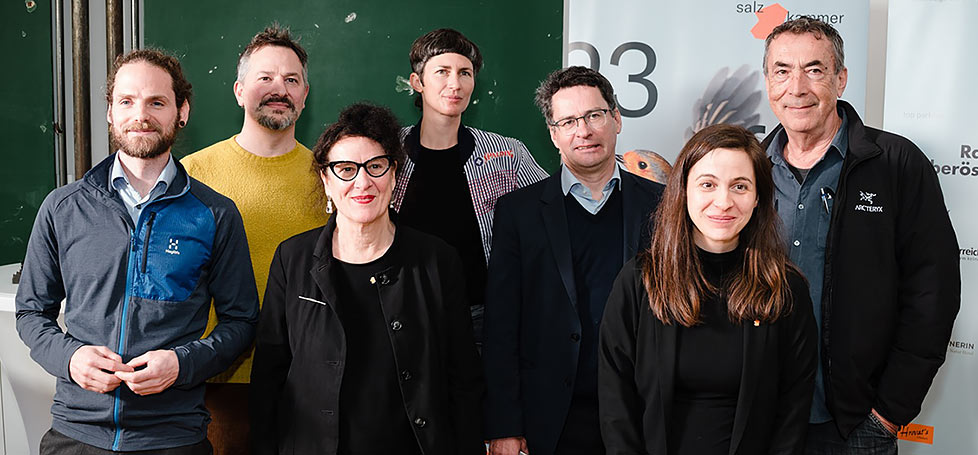SALZKAMMERGUT 2024
Using soil protection and vacancy to our advantage

Arthur Schindelegger (TU Wien), Gerald Priewasser-Höller (Curating Spaces), Elisabeth Schweeger (Artistic Director 2024), Simone Barlian (Curating Spaces), Arthur Kanonier (TU Wien), Eva Mair (2024 Director of Building Culture/Craftsmanship), HvG
Salzkammergut Capital of Culture 2024: Hubert von Goisern initiates the project "Using soil protection and vacancy to our advantage".
The European Capital of Culture Salzkammergut 2024 wishes to counter building vacancy and the waste of land. Together with the Institute for Spatial Planning at the Vienna University of Technology and the "Curating Spaces" collective, two research projects have been initiated under the title "Using soil protection and vacancy to our advantage" - with the goal of using vacant properties – initially for cultural purposes and later expanding the remit to other uses. The project was proposed by Hubert von Goisern.
"It's a sad fact that we're losing more and more grassland," the musician expounded his commitment to the topic. At the presentation of the project on Wednesday in Bad Goisern, he opposed the idea of constant growth. "Before we build over all the meadows, I would like for there to be fewer people," he admitted. But that's not really necessary, "there are always people leaving". He would like politicians to deal responsibly with land as a resource - for example by prescribing photovoltaics for large low-rise buildings or trees to provide shade in car parks.
The idea for the project arose from the question of where could be made available to the cultural scene, explained the Capital of Culture's artistic director, Elisabeth Schweeger. Suitable buildings and rooms for the independent scene are "in short supply". A survey of vacant buildings was therefore commissioned. It remains to be seen how the results can actually be used. Partners of the Capital of Culture will have access to the data and will be able to get in touch with interested property owners.
But Schweeger also sees herself as a source of inspiration: "2024 is a date between others. We live on," and she hopes that at least a discussion will get under way and that, triggered by the project, adequate use of vacant buildings will happen in the future. Simone Barlian from Curating Spaces is also convinced that, "Spaces remember. Once a space has been temporarily opened up for a certain format, it makes a difference".
Curating Spaces has compiled an inventory of the unused spaces in the 23 Capital of Culture municipalities. The term "vacancy" includes not just unused buildings, but abandoned company premises, empty parking spaces and overgrown green spaces too. The research had to rely heavily on word of mouth, since vacancies are not always proudly presented and - unless they are for sale - are not listed anywhere. Nonetheless, meticulously detailed work turned up 300 properties into which could be breathed new life, for example an abandoned fairytale park in Grünau and an empty skiers' lodge in Gosau.
In a second part of the project, the Capital of Culture will work together with the Technical University (TU) Vienna in the field of land conservation - here the collected data will be analysed and possibilities for compact settlement development will be debated in discussions with residents, experts and decision-makers and in workshops. Experts such as Arthur Schindelegger from the Vienna University of Technology are also surprised that the raw material of land is still being used very wastefully. "The population isn't expanding much in this country and yet we're still rolling on through with diggers."
